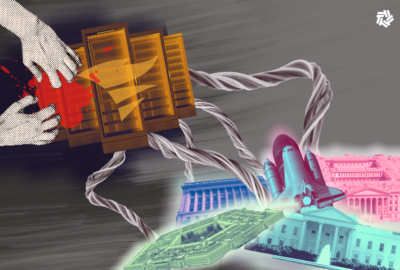To listen to the Federal Newscast on your phone or mobile device, subscribe in PodcastOne or Apple Podcasts. The best listening experience on desktop can be found using Chrome, Firefox or Safari.
- Officials with the Justice Department are sending a warning to government contractors that they will be turning up the False Claims heat on cybersecurity fraud. Acting Assistant Attorney General Brian Boynton told the Federal Bar Association Qui Tam Conference that for what the government pays for systems or services that are supposed to comply with required cybersecurity standards, if companies fail to do so, it is not difficult to imagine a situation where False Claims Act liability may arise. Boynton said cybersecurity was one of six key priorities for the civil division when it comes to the False Claims Act.
- Four technology and cybersecurity companies endorsed the idea of mandatory reporting of cybersecurity incidents. The heads of Microsoft, FireEye, Crowdstrike and SolarWinds testified before the Senate Intelligence Committee about the SolarWinds breach. They told lawmakers that sharing this information in a timely manner is crucial to response efforts. They qualified that such disclosures should be confidential to allow companies to prepare for liabilities. They also recommended there be a single federal agency to report to, and that such an agency would then disseminate the information to relevant parties.
- The Thrift Savings Plan is at last seeing improvements under the Federal Information Security Modernization Act. Auditors said the Federal Retirement Thrift Investment Board achieved a Level Four on seven out of eight FISMA domains. That means the TSP has a managed and measured information security posture. It’s better than previous years — the TSP board previously scored 1s and 2s back in 2019 and 2018. The agency said the improvements are part of a long-running effort to improve the TSP’s cybersecurity posture.
- Two multi-billion dollar multiple award contracts receive the go-ahead to begin accepting orders. The General Services Administration and NOAA hopefully are out from under protests of their respective major IT services contracts. GSA yesterday re-awarded its $5.5 billion 2nd Generation IT, or 2GIT blanket purchase agreement to 70 vendors, including 50 small firms. GSA initially made 75 awards under 2GIT in November 2019 only to see it come under protest. NOAA faced a similar challenge in awarding its $2.1 billion NOAA mission IT Services, or NMITS BPA. It made awards in November and only recently won its protests. Eighty small businesses will be competing for task orders across 11 functional areas.
- The Postal Service has awarded a 10-year contract to Oshkosh Defense to create its next-generation delivery vehicle fleet. The USPS expects the first delivery vehicles will arrive on routes by 2023. The next-generation delivery vehicles will run on fuel-efficient internal combustion engines or electric batteries. The Postal Service says vehicles can be retrofitted to keep pace with advances in electric vehicle technologies. Postmaster General Louis DeJoy said the next-generation delivery vehicle program will expand the agency’s capacity to deliver greater volumes of packages. (Federal News Network)
- After a bumpy road during the pandemic, the Defense Health Agency said it is on track to take over all military hospitals and clinics from the services by the end of the year. What the means for patients is still to be determined. DHA originally planned to push hundreds of thousands of patients from military hospitals to the private sector. However, after concerns over the plan and stresses from COVID-19, DHA is rethinking how that will work. (Federal News Network)
- The Defense Department is waiving its usual rules to let its health care beneficiaries get COVID vaccines free of charge, wherever they’re available, for as long as the pandemic lasts. A notice DoD published in the Federal Register Tuesday says the pandemic is a “special circumstance” that justifies the change. Normally, enrollees in DoD’s TRICARE Prime plan need a referral from their primary care provider before TRICARE will cover their out-of-network medical care.
- DoD aims to vaccinate all of its employees in the National Capital Region, including civilians and contractors. The Pentagon’s latest COVID-19 vaccination plan, published late last week, says the department plans to administer the vaccine to 50,000 employees who work on the “Pentagon Reservation.” That includes the Pentagon itself, the nearby Mark Center in Alexandria, Virginia, and leased office space nearby. Like all other vaccination programs, there’s a limited supply, and DoD is allocating doses based on priority groups. Nonetheless, it’s one of only a handful of federal employers thus far to offer vaccines directly to its civilian employees, regardless of their job functions.
- The Navy is preparing to address extremism within its ranks. Upon taking office, Defense Secretary Lloyd Austin called on military units to take one day over the next two months to address extremism. The Navy is outlining exactly how it will do that. Commanders will talk with sailors about the damaging effects of extremism and its corrosive acts on the force. The Navy is supplying leaders with discussion guides and slides that remind sailors of the meaning of the oath of office and actions that betray that oath. The Navy will also conduct listening sessions on core values and race and diversity.
- Two lawmakers want to ensure cost-benefit analyses happen before any future federal relocations. Maryland Sen. Chris Van Hollen (D) and Virginia Rep. Jennifer Wexton (D) introduced the Conducting Oversight to Secure Transparency or COST of Relocations Act. The bill would require agencies to examine real estate and staffing costs, employee attrition, and other metrics before making any proposed moves. The results of the analysis would be submitted to the agency’s inspector general. The bill has the support of federal unions and good government groups.
- Rep. Gerry Connolly (D-Va.) is reintroducing two bills that could have an impact on the federal workforce. The Merit Systems Protection Board Empowerment Act would authorize the board through 2026. It would also give the MSPB authority to conduct certain surveys of the federal workforce. Connolly also reintroduced the National Security Diversity and Inclusion Workforce Act. That bill would expand career development programs. And it would require agencies to publicly post plans for addressing diversity and inclusion.
- Members of the House Oversight and Reform Government Operations Subcommittee spent much of yesterday’s hearing on the federal workforce rehashing old policies from the Trump administration. Republicans said former President Donald Trump’s Schedule F order would have allowed agencies to more quickly fire certain employees. A former Domestic Policy Council adviser to Trump said Schedule F would have applied to one to three percent of the workforce, or over 60-thousand federal employees. Democrats said Congress needs to do more to ensure no president tries to implement anything remotely similar ever again.
- The president has a new leader in mind for a beleaguered federal agency. President Joe Biden tapped Kiran Ahuja to be the director of the Office of Personnel Management. Ahuja served as the agency’s chief of staff for the last two years of the Obama administration. And she led former President Barack Obama’s White House Initiative on Asian Americans and Pacific Islanders. Ahuja will be the first South Asian and first Asian American woman to lead OPM if confirmed. OPM has experienced instability and high levels of turnover over the last two administrations. (Federal News Network)
Copyright
© 2024 Federal News Network. All rights reserved. This website is not intended for users located within the European Economic Area.




